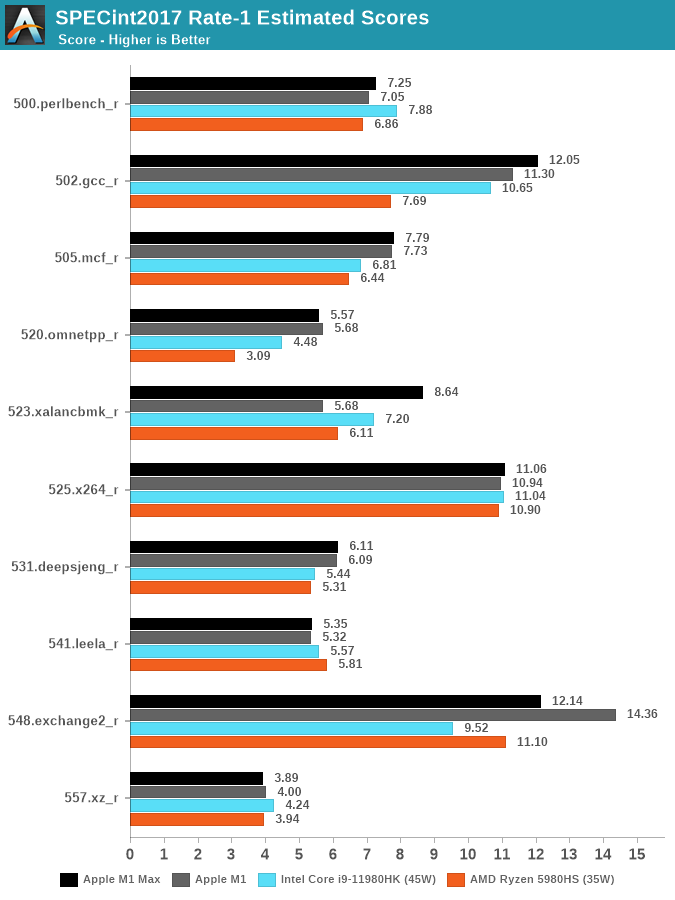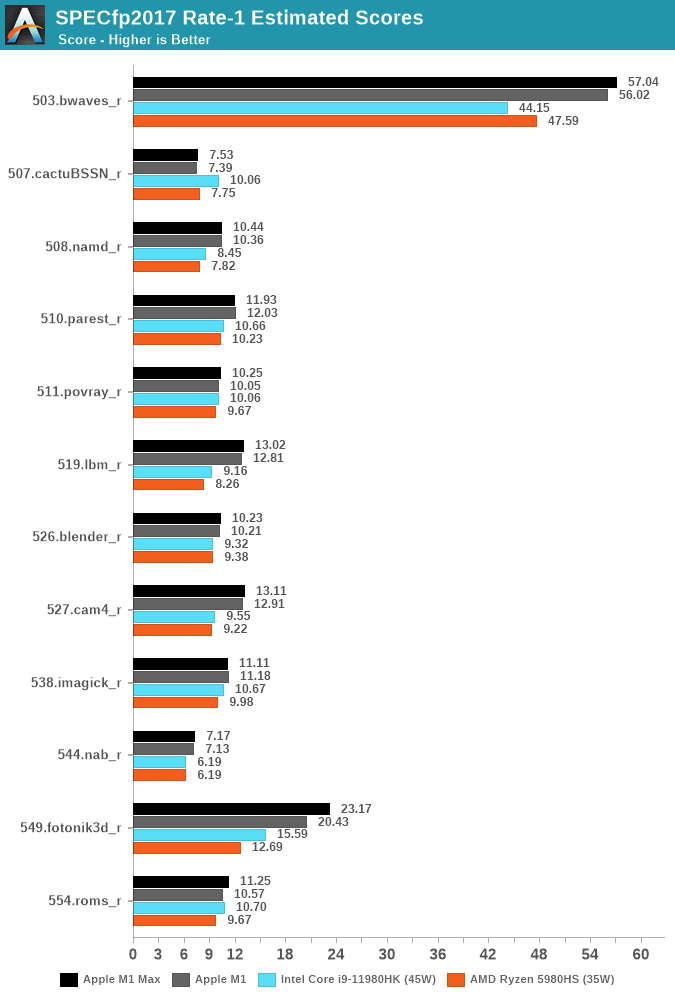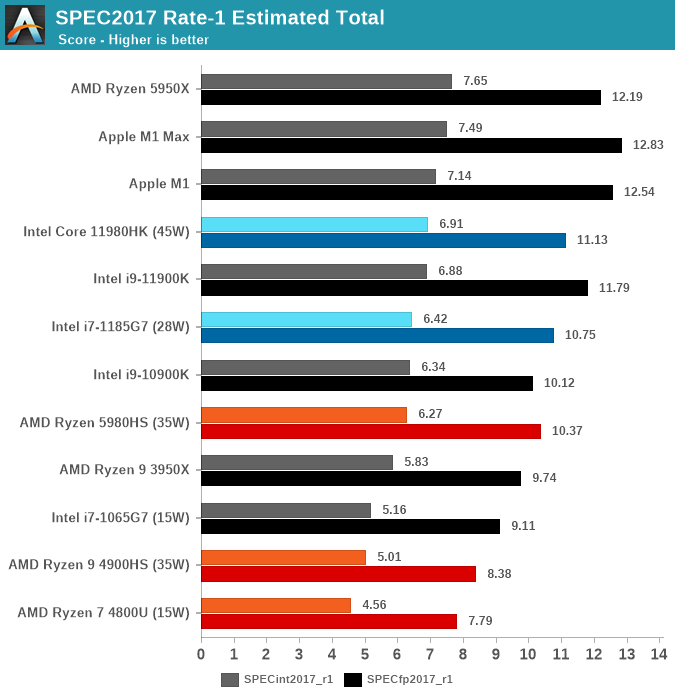Apple's M1 Pro, M1 Max SoCs Investigated: New Performance and Efficiency Heights
by Andrei Frumusanu on October 25, 2021 9:00 AM EST- Posted in
- Laptops
- Apple
- MacBook
- Apple M1 Pro
- Apple M1 Max
CPU ST Performance: Not Much Change from M1
Apple didn’t talk much about core performance of the new M1 Pro and Max, and this is likely because it hasn’t really changed all that much compared to the M1. We’re still seeing the same Firestrom performance cores, and they’re still clocked at 3.23GHz. The new chip has more caches, and more DRAM bandwidth, but under ST scenarios we’re not expecting large differences.
When we first tested the M1 last year, we had compiled SPEC under Apple’s Xcode compiler, and we lacked a Fortran compiler. We’ve moved onto a vanilla LLVM11 toolchain and making use of GFortran (GCC11) for the numbers published here, allowing us more apple-to-apples comparisons. The figures don’t change much for the C/C++ workloads, but we get a more complete set of figures for the suite due to the Fortran workloads. We keep flags very simple at just “-Ofast” and nothing else.

In SPECint2017, the differences to the M1 are small. 523.xalancbmk is showcasing a large performance improvement, however I don’t think this is due to changes on the chip, but rather a change in Apple’s memory allocator in macOS 12. Unfortunately, we no longer have an M1 device available to us, so these are still older figures from earlier in the year on macOS 11.
Against the competition, the M1 Max either has a significant performance lead, or is able to at least reach parity with the best AMD and Intel have to offer. The chip however doesn’t change the landscape all too much.

SPECfp2017 also doesn’t change dramatically, 549.fotonik3d does score quite a bit better than the M1, which could be tied to the more available DRAM bandwidth as this workloads puts extreme stress on the memory subsystem, but otherwise the scores change quite little compared to the M1, which is still on average quite ahead of the laptop competition.

The M1 Max lands as the top performing laptop chip in SPECint2017, just shy of being the best CPU overall which still goes to the 5950X, but is able to take and maintain the crown from the M1 in the FP suite.
Overall, the new M1 Max doesn’t deliver any large surprises on single-threaded performance metrics, which is also something we didn’t expect the chip to achieve.










493 Comments
View All Comments
arglborps - Friday, March 25, 2022 - link
Exactly. In the world of video editing suites Premiere is the slowest, buggiest piece of crap you can think of, not really a great benchmark except for how fast to crash an app.DaVinci and Final Cut run circles around it.
ikjadoon - Monday, October 25, 2021 - link
AnandTech literally tested the M1 Max on PugetBench Premiere Pro *in this article*. Surprise, surprise 955 points on standard, 868 on extended, thus just 4% slower than a desktop 5950X + desktop RTX 3080."biggest problem with the Apple eco system" Huh? Premiere Pro has already been written in Apple Silicon's arm64 for macOS. It's been months now.
>We’ll start with Puget System’s PugetBench for Premiere Pro, which is these days the de facto Premiere Pro benchmark. This test involves multiple playback and video export tests, as well as tests that apply heavily GPU-accelerated and heavily CPU-accelerated effects. So it’s more of an all-around system test than a pure GPU test, though that’s fitting for Premiere Pro giving its enormous system requirements.
You clearly did not read the article and a misinformed "slight" against Apple's SoC performance: "These benchmarks disagree with my narrative, so I need to change the benchmarks quickly now."
I don't get why so many people are addicted to their "Apple SoCs can't be good" narrative that they'll literally ignore:
1) the AnandTech article that benchmarked what they claimed never got benchmarked
2) the flurry of press when Adobe finally ported Premiere Pro to arm64
easp - Monday, October 25, 2021 - link
So if one can't really compare "real-world" benchmarks between platforms how are you so sure that Mac's fall-short?sirmo - Monday, October 25, 2021 - link
We aren't shore of anything. Why are we even here?SarahKerrigan - Monday, October 25, 2021 - link
Sure, OEM submissions are mostly nonsense. SPEC is a useful collection of real-world code streams, though. We use it for performance characterization of our new cores, and we have an internal database of results we've run inhouse for other CPUs too (currently including SPARC, Power, ARM, IPF, and x86 types.) Run with reasonable and comparable compiler settings, which Anandtech does, it's absolutely a useful indicator of real world performance, one of the best available.schujj07 - Monday, October 25, 2021 - link
You are the first person I have talked to in industry that actually uses SPEC. All the other people I know have their own things they run to benchmark.phr3dly - Monday, October 25, 2021 - link
I'm in the industry. As a mid-sized company we can't afford to buy every platform and test it with our workflow. So I identify the spec scores which tend to correlate to our own flows, and use those to guide the our platform evaluation decisions.Looking at specific spec scores is a reasonable proxy for our own workloads.
0x16a1 - Monday, October 25, 2021 - link
uhhhh.... SPEC in the industry is still used. SPEC2000? Not anymore, and people have mostly moved off of 2006 too onto 2017.But SPEC as a whole is still a useful aggregate benchmark. What others would you suggest?
sirmo - Monday, October 25, 2021 - link
It's a synthetic benchmark which claims that it isn't. But it very much is. Anything that's closed source and compiled by some 3rd party that can't be verified can be easily gamed.Tamz_msc - Tuesday, October 26, 2021 - link
LOL more dumb takes. Majority of the benchmarks are licensed to SPEC under open-source licenses.https://www.spec.org/cpu2017/Docs/licenses.html